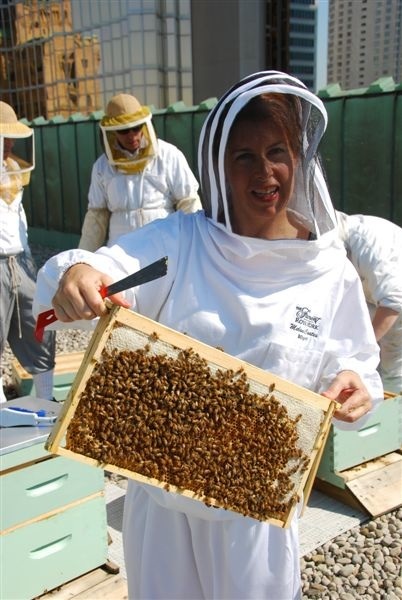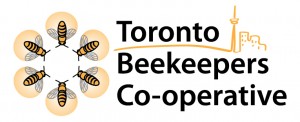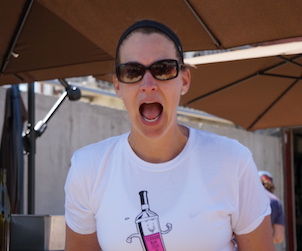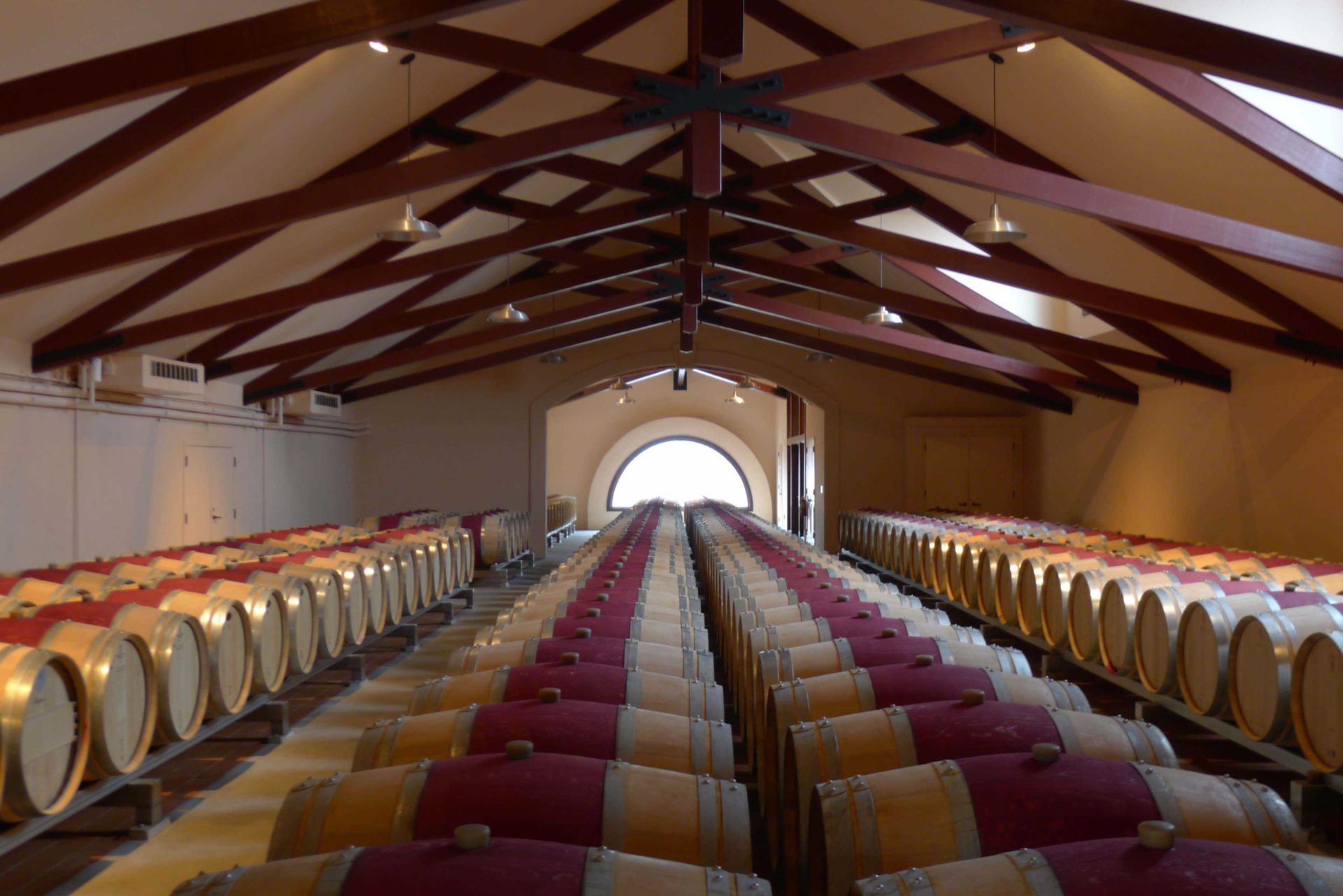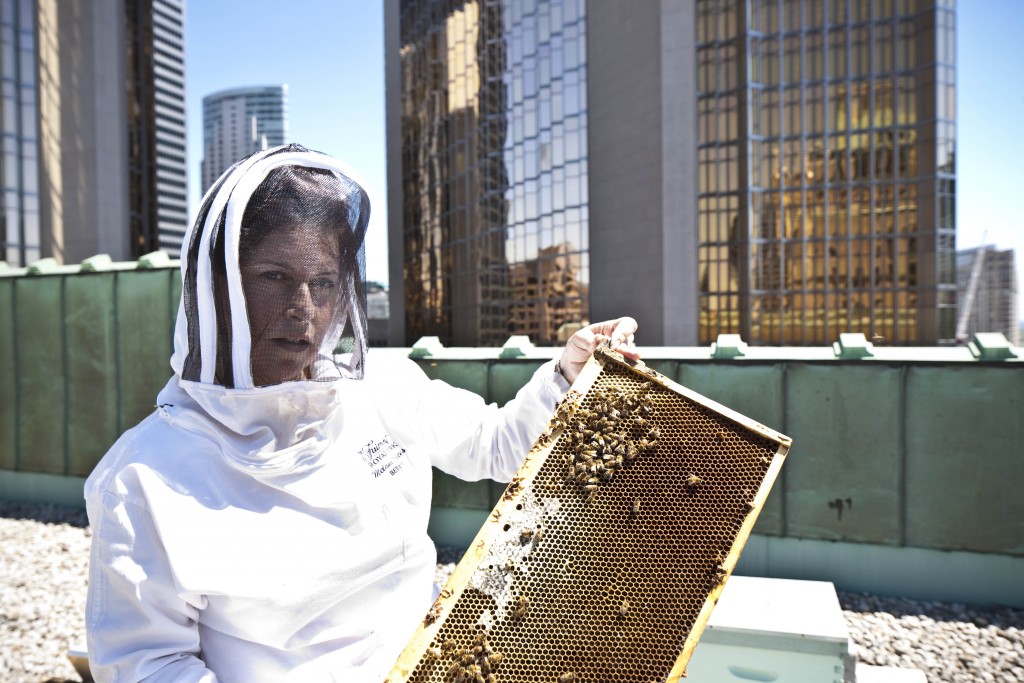
Perhaps the only person who can look good in a beekeeping suit, Melanie Coates. (Photo Credit Geoff Fitzgerald)
This week we speak with Melanie Coates, a lady who knows a fair bit about urban beekeeping.
GFR: So Melanie, tell us a little about the Toronto Beekeepers Co-operative?
Our co-operative of urban beekeepers has been around since 1985. We currently have over 40 volunteer beekeepers caring for bee yards in Downsview Park, Black Creek Community farm, Fairmont Royal York hotel and the Toronto Botanical Gardens. Together we create opportunities for people to work with bees, to share knowledge and promote education about bees and urban ecology.
GFR: And where did your passion for bees come from?
MC: I have a brother that is a beekeeper and we both grew up in rural British Columbia with close ties to nature. My renewed passion for bees was sparked in 2008 when an opportunity presented itself within the herb garden of the 14th floor rooftop of the Fairmont Royal York. The hotel’s kitchen brigade had been growing herbs on the roof for ten years, and it had become an urban refuge for lady bugs and other tiny flying insects.
It made perfect sense to the Executive Chef and me that, by envisioning a three-hive apiary of pollinating bees, we could have an impact on the herb garden and the surrounding urban flora. We wanted to take our environmental stewardship to another level and thus the hotel’s rooftop bee yard was established in the spring of 2008 with a gifted hive from the Toronto Beekeepers Co-op and Foodshare. I joined the co-op that year. My passion and concern for bees has evolved over the years.
Honey bees are social insects and sometimes the honey bee colonies I care for serve as a metaphor for the corporate world I find myself navigating.
GFR: On the 28th of this month the Toronto Beekeepers Co-operative are hosting a daylong workshop… what’s happening?
MC: This month, the Toronto Beekeepers Co-op will hold its annual daylong workshop for Toronto’s urban bee-curious. The TBC will conduct an educational day of exploration,featuring presentations from honey bee and wild bee experts and urban beekeeping enthusiasts. Bee-Day will explore a wide range of apiary basics, including: bee friendly gardens; interactive hive and equipment demonstrations; bee biology and lifecycles; hive management and wild bee conservation.
A panel of bee experts and activists, drawn from academia, local producers and hobbyists, will explore how cities are addressing the increasing number of bee deaths. Funds raised by the $50.00 admission fee will go to further the educational work of the Toronto Beekeepers Co-operative. The day of bee exploration will be held at FoodShare, 90 Croatia St., Toronto (Bloor & Dufferin area) from8:30 a.m. through to 4:30 p.m. on Saturday, February 28, 2015. Additional information may be obtained by
email at intro@torontobees.ca or by visiting www.torontobees.ca
Twitter: @torontobees or #Bee-Day
GFR: Does one not require a massive piece of land to keep bees? How would one go about beekeeping in the GTA?
MC: Finding the right GTA location to keep bees demands an awareness of what the bees need to thrive and avoiding what might stress them in an urban setting. One also might be concerned with not stressing your human neighbours. All honey bees need a close clean water source and some level of protection to survive our cold winters. Thankfully rooftops offer a warmer base for bees to winter from, but not all rooftops are environmentally suitable to host a bee yard, and they may also not meet the criteria of the Ontario Bee Act.
The Ontario Bee Act places restrictions on where one might keep hives.
Section 21 (1) of the Bees Act, R.S.O.1990, Chapter B.6 reads as follows: “No person shall be a beekeeper in Ontario without a certificate of registration issued by the Provincial Apiarist.” Given the crisis many of the bees in Sothern Ontario are facing, I stand in full support of all hives being registered. But before you do that, I would suggest you reach out to establish organizations such as the Ontario Beekeepers Association and see what courses you might take to understand the responsibility of keeping bees; or if you are looking for guided hands-on experience, you might want to become a member of the Toronto Beekeepers Co-op. Also the Urban Toronto Beekeepers’ Association has a good monthly gathering for sharing ideas.
GFR: Our readership will be well aware of the reported bee deaths in the past five years. Where does our current understanding of this situation lie?
MC: Our upcoming Bee-day on February 28 is an ideal opportunity to get varying perspectives on common bee diseases and the ongoing bee deaths in Southern Ontario. I feel that key strategies for bee health should be based on experience and science. I have witnessed urban bees die of disease and mites. It has also been made clear through science that Neonics are killing bees in the countryside.
This is the most widely used insecticide in the world, and they are the biggest threat to the structure and ecological integrity of the ecosystem. It is a positive sign that the Ontario Government is preparing legislation to restrict the use of this on at least two crops: corn and soybeans.
GFR: In closing would you share with us another amazing fact about bees please?
MC: A colony of bees has 3 castes: queen, worker and drone. There is only one queen perhive; and when the temperature outside is just right, she will mate on one mating flight in her life, and will thereafter go on to lay 1,500- 2,000 eggs per day. This is her most important task.
GFR: Superb. Thanks for you time Melanie!
 Edinburgh-born/Toronto-based Sommelier, consultant, writer, judge, and educator Jamie Drummond is the Director of Programs/Editor of Good Food Revolution… And he’s serious about this beekeeper look… it may catch on.
Edinburgh-born/Toronto-based Sommelier, consultant, writer, judge, and educator Jamie Drummond is the Director of Programs/Editor of Good Food Revolution… And he’s serious about this beekeeper look… it may catch on.

